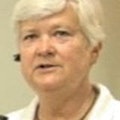EMMITSBURG, MD – In 1973, a group of fire service leaders from across the country rolled up their sleeves and got to work.
While many federal commissions actually contracted out their assignments to consultants, the 18 members of the National Commission on Fire Prevention and Control wouldn’t think of relinquishing their duties, according to "America Burning" report Commissioner Louis J. Amabili.
He reviewed the commission’s recommendations April 9 during a panel discussion before graduates of the National Fire Academy’s Executive Fire Officer program.
Other members of the panel included Former NFA Superintendent Joe Donovan, Puerto Rico Fire Chief Carmen Rodriguez, Trenton Battalion Chief Leonard Charmichael, and J. Curtis Varone, director, public agency training council in Rhode Island.
The program was held in conjunction with the 22nd annual EFO Graduate Symposium.
Amabili said members “put their heart and soul” into their mission.
Many of the recommendations contained in "America Burning" reflect issues that departments are still facing, and some that have been addressed.
The commission’s suggestions included the establishment of the USFA to provide national focus for the nation’s fire problem; a public education office; a program to evaluate equipment used by firefighters; and a National Fire Academy to advance fire service personnel.
They also saw the need for a diverse fire service, mutual aid agreements and fire protection plans.
Amabili also said it was the members’ dream to have a “finishing school” for officers and officer candidates.
The "America Burning" document wouldn’t sit on a shelf and gather dust as did many federal reports.
Donovan took on the recommendation for the officer training, and worked diligently to bring it to life. He envisioned the program as similar to the FBI academy.
He kept his work under wraps for quite a while, fearing there would be opposition. Donovan said he did smooth things over once his idea was unveiled, adding that keeping people out of the loop during the conception proved to be the right decision.
Donovan smiles with pride when he is referred to as “the father of the EFO.”
Listen to the panel’s discussion in the included video.
About the Author
Susan Nicol
News Editor
Susan Nicol is the news editor for Firehouse.com. She is a life member and active with the Brunswick Volunteer Ambulance & Rescue Company, Oxford Fire Company and Brunswick Vol. Fire Co. Susie has been an EMT in Maryland since 1976. Susie is vice-president of the Frederick County Fire/Rescue Museum. She is on the executive committee of Frederick County Volunteer Fire and Rescue Association. She also is part of the Maryland Institute for Emergency Medical Services Systems (MIEMSS) Region II EMS Council. Susie is a board member of the American Trauma Society, Maryland Division. Prior to joining the Firehouse team, she was a staff writer for The Frederick News-Post, covering fire, law enforcement, court and legislative issues.
